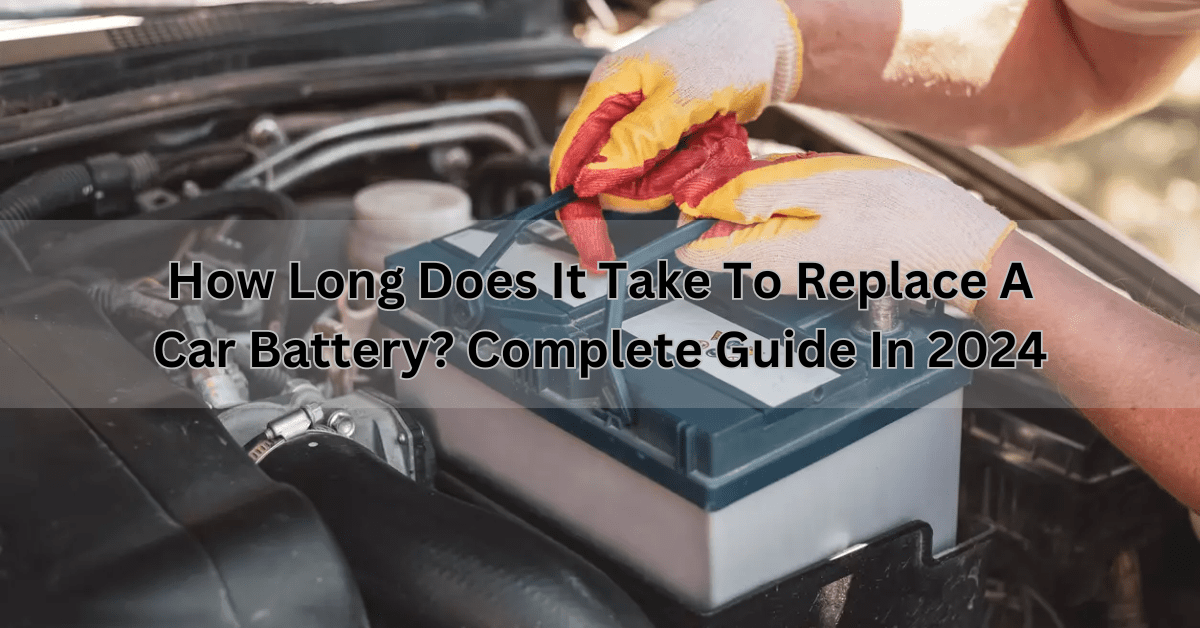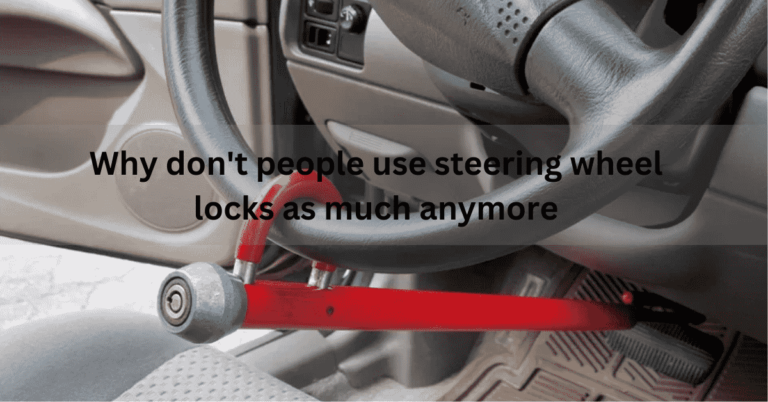How long does it take to replace a car battery? complete guide in 2024
Do you know how important a car battery is to make your car start? But what happens when your car battery dies? How long does it take to replace a car battery?
Don’t worry, replace a car battery is easy and won’t take too long. It can be done in just 15 to 30 minutes by a professional or even by yourself if you follow some simple steps.
So, let’s learn more about How long does it take to replace a car battery? and get you back on the road in no time!
How long does it take to replace a car battery?
Replacing a car battery usually takes about 15 to 30 minutes.
Here’s why:
1. Open the Hood: First, you need to open the hood of the car.
2. Locate the Battery: Then, find the battery in the car. It’s usually under the hood.
3. Disconnect the Cables: Next, you disconnect the cables attached to the battery.
4. Remove the Old Battery: Take out the old battery carefully.
5. Install the New Battery: Put the new battery in the same place as the old one.
6. Connect the Cables: Then, connect the cables back to the new battery.
7. Close the Hood: Finally, close the car’s hood.
Remember, it’s important to be careful and follow instructions to stay safe while replacing a car battery. If you’re not sure how to do it, it’s best to ask an adult or a professional for help.

Also Read:
How To Avoid Scraping Bottom Of Car On Driveway? In 2024
Car Wobbles When Driving Slow-Common Causes And Fixes 2024
Why Car Batteries Are Important?
Car batteries may seem small, but they play a big role in making your car work.
Here’s why they’re so important:
1. Starting Your Car:
Car batteries give your car the power it needs to start. Without a working battery, your car won’t be able to turn on, and you won’t be able to go anywhere.
2. Powering Electronics:
Car batteries also power the electronics in your car, like the lights, radio, and air conditioner. These electronics make your ride safer and more comfortable.
3. Charging Other Devices:
Some car batteries can even charge your phone or other devices. This can be helpful, especially if you’re on a long road trip and need to stay connected.
4. Emergency Situations:
In emergencies, like if your alternator fails, your battery can keep your car running until you can get help. It’s like a backup plan for your car.
5. Maintenance Reminder:
Checking your car battery regularly can also remind you to keep up with other car maintenance tasks. It’s an important part of taking care of your car.
When to Replace a Car Battery?
If your car has trouble starting or if the lights look dim, it might mean the battery needs changing.
Other signs include problems with the radio or windows not working right.
It’s important to pay attention to these signs so you don’t get stuck with a car that won’t start.
Signs of a Failing Battery:
1. Dim Headlights:
If the headlights look dimmer than usual, it could be a sign of a failing battery.
2. Slow Engine Start:
If the engine takes longer to start than normal or sounds sluggish, it may indicate a weakening battery.
3. Dashboard Warning Light:
Some cars have a dashboard warning light that indicates battery problems. If this light comes on, it’s essential to get the battery checked.
4. Electrical Issues:
Problems with electrical components such as the radio, power windows, or door locks can signal battery issues.
5. Corrosion or Buildup:
Corrosion or buildup around the battery terminals can hinder the flow of electricity, leading to battery failure.
6. Strange Smells:
A sulfur or rotten egg smell near the battery could indicate a leak or malfunction, requiring immediate attention.
7. Frequent Jump Starts:
If you find yourself needing jump starts frequently, it may be a sign that the battery is losing its ability to hold a charge.
8. Age of the Battery:
As batteries age, they become less reliable. If your battery is nearing the end of its typical lifespan (around 3 to 5 years), it’s wise to consider replacement, even if no other signs are present.
9. Difficulty Starting in Cold Weather:
Cold temperatures can put extra strain on a weak battery, causing difficulty starting the car in winter.
10. Visible Damage:
Any visible damage to the battery, such as cracks, dents, or bulges, indicates a need for immediate replacement.
Recognizing these signs of a failing battery can help prevent unexpected breakdowns and ensure the reliable operation of your vehicle.
How Long Car Batteries Last
Car batteries usually last around 3 to 5 years, but this can change depending on things like weather and how you drive.1
Really hot or cold weather can make a battery wear out faster.
If you take good care of your battery, like keeping it clean and checking how charged it is, it might last longer.
Should You Replace a Battery Before it Dies?
It’s a good idea to change a car battery before it dies completely.
If you wait until it dies, you might end up stuck somewhere or have other problems with your car’s electronics.
It’s best to have a mechanic check your battery regularly to see if it needs changing.
That way, you won’t have to worry about your car not starting when you need it.

Step-by-Step Guide for replace a car battery:
Safety Precautions:
Replacing a car battery requires safety precautions to keep you safe. Here are some important tips:
1. Wear gloves and safety glasses:
These protect your hands and eyes from battery acid and debris.
2. Park in a safe area:
Choose a flat surface away from traffic to work on your car.
3. Turn off the engine and headlights:
Make sure the car is completely turned off to avoid electric shocks.
4. Disconnect the negative terminal first:
Always remove the negative (-) cable first to prevent electrical accidents.
5. Handle the battery carefully:
Car batteries are heavy, so lift them with care to avoid straining your back or dropping the battery.
6. Dispose of the old battery properly:
Take the old battery to a recycling center or auto parts store for safe disposal.
Tools Required:
You’ll need a few tools to replace a car battery:
1. Wrench or socket set:
To loosen and remove the battery terminals.
2. Battery terminal cleaner:
To clean corrosion from the terminals.
3. Battery terminal brush:
For scrubbing off rust and dirt.
4. Battery hold-down wrench:
If your battery has a hold-down bracket, you’ll need this tool to remove it.
5. Battery charger:
Optional but helpful for testing the new battery before installation.
Step-by-Step Guide:
Follow these steps to replace your car battery:
1. Locate the battery:
Most car batteries are located under the hood, near the engine.
2. Remove the negative terminal:
Loosen the nut on the negative terminal (-) and disconnect the cable.
3. Remove the positive terminal:
Repeat the process for the positive terminal (+).
4. Remove the old battery:
Use a battery hold-down wrench to loosen the hold-down bracket, if present. Lift the old battery out of the car.
5. Clean the battery tray:
Use a battery terminal cleaner and brush to clean any corrosion or dirt from the battery tray.
6. Install the new battery:
Carefully place the new battery into the battery tray, ensuring it’s positioned correctly.
7. Connect the positive terminal:
Attach the positive terminal (+) to the corresponding post on the new battery.
8. Connect the negative terminal:
Repeat the process for the negative terminal (-).
9. Secure the battery:
If applicable, use the battery hold-down wrench to tighten the hold-down bracket.
10. Test the new battery:
Turn on the car and check that the electrical systems are working properly.
By following these safety precautions and using the right tools. You can safely replace your car battery and keep your vehicle running smoothly.
Cost of replacing a car battery
Average cost breakdown:
- When you need to replace a car battery, the average cost can vary depending on different factors.
- The cost usually includes the price of the new battery and the labor fees for installation.
- Prices for car batteries can range from around $50 to $200 or more, depending on the brand, type, and quality of the battery.
- Labor fees for installation can vary depending on where you go, but they generally range from $50 to $100.

How much does it cost to change a battery in a car?
- Changing a car battery usually costs between $100 to $300 in total.
- This cost can be higher if you have a more expensive car or if you choose a premium battery brand.
- Some auto shops may offer discounts or promotions, so it’s a good idea to shop around for the best deal.
- Regular maintenance and proper care of your car battery can help prolong its lifespan.
- Also reduce the need for frequent replacements, saving you money in the long run.
Should I replace my car battery before it dies?
- It’s a good idea to replace your car battery before it dies completely.
- If your battery gets too old, it might not start your car, which can be frustrating.
- By replacing it before it dies, you can avoid getting stuck somewhere with a car that won’t start.
- It’s like getting a new pair of shoes before your old ones have holes in them.
- So, if your battery is getting old or showing signs of weakness, it’s a smart move to replace it before it lets you down.
How can you tell if a battery needs replacing?
- You can tell if a battery needs replacing if your car has trouble starting.
- If the engine takes a long time to turn over or makes a clicking sound, it could mean the battery is weak.
- Another sign is if your lights are dim or flickering when you start the car.
- You can also check the battery’s age. If it’s older than three to five years, it might be time for a new one.
- So, if you notice any of these signs, it’s a good idea to get your battery checked and replaced if needed.
Is it better to charge a car battery or buy a new one?
- Sometimes, if your battery is just a little weak, you can charge it up instead of buying a new one.
- You can use a battery charger to give it a boost and get it working again.
- But if your battery is old or has been giving you trouble, it might be better to buy a new one.
- A new battery will be more reliable and last longer than one that’s been charged up a lot.
- So, if your battery is too weak or old, it’s probably better to say goodbye and get a shiny new one.
Frequently asked questions:
1. Does AutoZone install batteries?
Yes, AutoZone installs batteries. They have experts who can help you choose the right battery for your car and install it properly.
2. Why is my car acting weird after a new battery?
Sometimes, when you put in a new battery, the car’s computer gets reset. It might take some time for everything to adjust and work normally.
3. What happens if you replace your battery but your car still dies?
If your car still dies even after changing the battery, it could be a sign of a bigger problem, like issues with the alternator or electrical system.
4. Is it bad to drive with a dead battery?
It’s not safe to drive with a dead battery because your car won’t start, and important systems like lights and brakes might not work properly.
5. How long should a car run after a dead battery?
After jump-starting a car with a dead battery, it should run for at least 30 minutes to recharge the battery. If it doesn’t, there might be a problem.
6. How do you tell if a car battery is bad or just dead?
To check if a car battery is bad, use a multimeter to test its voltage. If it reads below 12.4 volts, it might be bad and need replacing.
Conclusion:
Replacing a car battery is a simple yet crucial maintenance task that ensures your vehicle runs smoothly.
If you suspect your battery needs replacing or if you’re experiencing any issues with starting your car, don’t hesitate to take action.
Visit your nearest auto parts store or schedule an appointment with a mechanic to get your battery checked and replaced if necessary.
Keeping your battery in top condition will help you avoid unexpected breakdowns and keep you safe on the road.
Don’t wait until it’s too late – prioritize your car’s battery health today!
Happy Driving.







